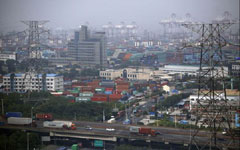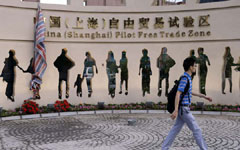So, as Chinese leaders stated last week, there won't be a massive stimulus despite the economic slowdown. There won't be money for local governments to build more ghost towns (enough is enough). There won't be large increases in industrial output, which used to be the main driver of GDP. There won't be as much growth in exports either, according to merchants from the continuing spring session of Canton Fair 2014 in Guangzhou.
And economists say things will remain by and large unchanged into the second quarter of the year, when GDP could fall further to just above 7 percent year-on-year.
|
 |
|
 |
What a joke, people will say. No rational government would turn all cities into a new system only six months after it named the very first pilot zone. But vying for an FTZ is only the game on the surface. If there is anything that would be beneficial to the country, as well as to the local economy, why do they want to wait for their turn?
Local governments want to grab whatever new economic opportunities they can, Although they know it is unrealistic for all of them to get FTZ status at the same time. However, why would all of them want FTZ status? They seem to think that it is the only thing that can give the local economy a boost during a lingering slowdown.
Does this behavior mean that in the second-largest economy in the world, at least in the eye of some local officials, there is simply no other opportunity available for regional development except an FTZ license from the central government?
One possible answer would be that, contrary to Beijing's original intention that the zone was to pioneer the use of more international business practices, some local officials tend to think the status would grant them greater freedom to work with overseas financial services, to perhaps attract investors and financiers for development projects that are either half-done or still on the drawing board.
